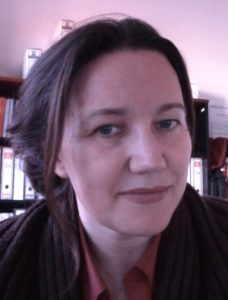Carmen Peláez-Moreno earned her Eng. degree in Telecommunications from the Public Univ. of Navarre (1997) and her PhD from University Carlos III Madrid (2002). She was a visiting researcher in several universities: Univ. of Westminster, London, UK (pregraduate, 1996), Univ. of Strathclyde, Glasgow, UK (postdoctoral fellowship, 2003), International Computer Science Institute, Berkeley, EEUU (postdoctoral fellowship, 2004 and 2006) and Univ. of Trento, Italy (postdoctoral, 2013), and University of Vienna (postdoctoral, 2021) including two maternity gaps in 2005 and 2007.
She is currently, associate professor in the Signal Theory and Communications department of the University Carlos III Madrid. In 2019, she earned the Full Professorship National Habilitation from ANECA.
Her research interests include speech recognition, perception and cognition, audio processing, affective computing, multimedia processing, machine learning and data analysis, information theory and formal concept analysis, artificial and biological neural networks and connectomics, and education. Her interdisciplinary vocation and ambition to cross-fertilize ideas from very different research communities is reflected in the wide variety of publications. She has coauthored 33 papers in JCR indexed journals and more than 50 conference communications. She has participated in 25 competitive research projects and 15 transfer contracts. She was PI of six National Research Framework funded projects and an industrial participated one.
She has received various prizes and awards: Best PhD. Thesis from the Spanish Official Telecommunication Engineering Association, 2002, Best Journal paper (2nd position), 2002, Aula Uni2-Univ. Carlos III prizes, Best Conference Paper, ECIR co-located workshop FCAIR (Formal Concept Analysis meets Information Retrieval), Moscow 2013, Best Conference paper, 2015, ICFCA (International Conference on Formal Concept Analysis), Winner project in the XIII Edition of the Vodafone Innovation Awards ‘Connecting for Good’, 2019.
Since 2017, she is a member of UC3M4Safety, a multidisciplinary group developing socio-technological solutions to fight against gender-based violence. She is the academic secretary of the Gender Studies Institute of the UC3M and a member of IEEE, COIT/AEI, RTTH (Speech Technologies Thematic Network) and AMIT (Research and Technologist Women Association).
In this line of work, she is participating in two projects (EMPATIA and SAPIENTIAE4Bindi, see details below), the last as IP, and has recently submitted a proposal for a Horizon Europe Innovation Action as coordinating partner involving 14 partners including 5 police departments of 5 European countries including the Spanish National Police, 2 civil society organizations and 6 research institutions and a small enterprise to deliver solutions to fight against gender-based violence. A Utility Model (see details below) is also part of the achievements of this line of work.
She had also previously collaborated with CESYA (Center for Subtitling and Audiodescription) towards improving the lives of disabled (blind) people employing speech recognition technologies. She had also participated in other 14 technology transfer contracts.
She has participated in several communication & out-reach activities: European Researcher’s Night 2020, T3chFest 2019 (Talk: “Bindi: a technology to detect and prevent violence against women”), III Scientific Tourism Meeting Lerín Tierra Estrella 2019 (Round table “The future that is coming”), Seminar “Emotions and Victims of Gender based Violence: new horizons” 2020 (Talk: “Detección de miedo en la voz y de violencia en el entorno acústico”),and several press and radio participations: Newtral (“The intelligent bracelet (…)”), Onda Cero Radio (“Artificial intelligence against gender-based violence”), 2021.
She has supervised more than 30 Final Year Projects (Master or Degree). Moreover, she has supervised 4 PhD students (30/01/2012, 04/02/2016 and 27/09/17-extraordinary mention-, 25/11/2019) and is currently supervising 2 more. Her students have been awarded with several prizes: Best Journal Paper, Spanish Speech Technologies Thematic Network in the 2012, 2016 and 2019 Edition prizes, Best posters in summer school RTTH (Speech Tech. Thematic Network), 2013 y 2015, Best TFM in the IV Edición of the Research Awards Pilar Azcárate or also in innovation with the best project in the Santander Explorer UC3M Space 2021. She has also participated in the organization of the 3 editions (since 2019) of the International Conference for Young Researchers with gender perspective.
She has served as proposal evaluation expert for REA for the H2020 FET OPEN and MSCA IF programmes, for the Swiss National Science Foundation (SNSF), 2011, 2019, Natural Sciences and Engineering Research Council of Canada (NSERC), 2013, Quality Agency Castilla y León, 2020, and was a collaborator of the ICT panel of the Spanish Research Council (AEI, Agencia Estatal de Investigación) for evaluation of proposals from the National Research Programme (2018-2021).
She participates habitually in paper evaluation for several journals, conferences and awards such as PLOSone, Springer Neural Computing and Applications, ESWA, EURASIP Elsevier Signal Processing, IEEE Transactions on Wireless Communications, Elsevier International Journal of Electronics and Communications, Springer Signal, Image and Video Processing, IEEE Trans. On Multimedia, IEE IET Computers & Digital Techniques, Best Final Year Project and PhD, Spanish Telecommunication Eng. Association (01/2005 – 04/2014), Best paper RTTH, 2020, INTERSPEECH (ISCA, 2007 – 2021), ICECS (IEEE, 08/2012), ICASSP (IEEE, 2018-2021), IberSpeech, (RTTH, 2012 – 2020), NOLISP (2011), EUSIPCO (2008), among others.
My recent projects and publications can be found in ResearchGate and LinkedIn and UC3M institutional portal.



